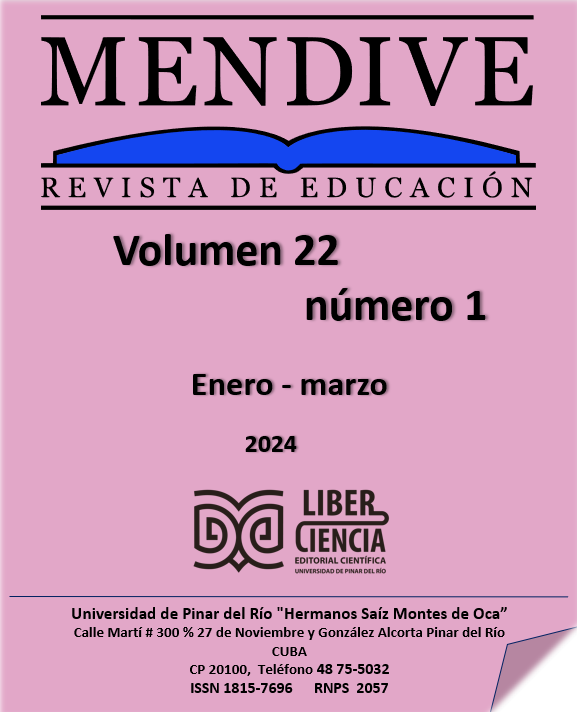Diagnosis of self-management of learning in Higher Mathematics I in Accounting and Finance
Main Article Content
Abstract
Given the need to promote self-management of learning, to aspire to a quality professional, a scientific contradiction is shown between what Higher Education aspires with greater access, entry and exit of the population with the necessary preparation for their successful performance as professionals and the limited methodological didactic procedure for the self management of learning in the teaching-learning process of Higher Mathematics in the distance education modality, which contributes to the training of professionals in the Accounting and Finance career, this article has as an objective, to show the results of the diagnosis made that allows structuring a scientific result to minimize the difficulties detected. Correspondingly, the research is based on the dialectical-materialist method as a general methodology for the analysis and interpretation of social problems, and a guide for the transformation of society. They were used as methods and techniques for the diagnosis of the current situation, among them the analysis-synthesis, the historical-logical, the inductive-deductive, the documentary analysis and surveys and interviews. The results obtained allow from the theory to define the self-management of learning in the teaching learning process in the Higher Mathematics I subject of the Accounting and Finance career in the distance modality, and specifies the insufficiencies in the direction of the teaching learning process towards independence and self-management of learning, as well as unfavorable evaluations in students and poor development of the necessary skills in the teaching-learning process of Higher Mathematics I.
Downloads
Article Details

This work is licensed under a Creative Commons Attribution-NonCommercial 4.0 International License.
References
Bonet, L.; Garcés, S. & Recio, R. (2018) Autogestión del conocimiento en la Química General a través de la plataforma interactiva Moodle. Roca: Revista Científico Educaciones de la provincia de Granma, 15(1).
Calcines, M.; Valdés, J. & Montegudo, R. (2017). La autogestión del conocimiento: ¿una meta inalcanzable? EDUMECENTRO, 9(2), 225-229.
Faustino, A.; Wongo-Gungula, E. & Arrocha, O. (2019). Las tecnologías computacionales y su repercusión en el proceso de formación matemática en la República de Angola. Revista Educación, 43(1). https://doi.org/10.15517/revedu.v43i1.25502
González, Ó.; Aguilar, M.A.; Aguilar, F.J. & Lucas, M. (2018). Evaluación de entornos inmersivos 3D como herramienta de aprendizaje B-Learning. [Evaluation of 3D immersive environments in B-Learning implementations]. Educación XX1, 21(2), 417-440, https://doi.org/10.5944/educXX1.16204
Leyva, E.G & Lariot, K. (2019). Consideraciones teórico-metodológicas sobre la autogestión del conocimiento en el proceso de enseñanza-aprendizaje. Atlante. Cuadernos de Educación y Desarrollo. https://www.eumed.net/rev/atlante/index.htmll
Medina, H.; Lagunes, A. & Torres, C.A. (2018). Percepciones de Estudiantes de Nivel Secundaria sobre el uso de las TIC en su Clase de Ciencias. Información tecnológica, 29(4), 259-266. https://dx.doi.org/10.4067/S0718-07642018000400259
Mendo, L.; Tarifa, L.; Portillo, R.; López, S.A. (2022). Retos y oportunidades de los ambientes híbridos para el aprendizaje activo en la formación de ingenieros. Revista electrónica ANFEI Digital, 9(14). http://www.anfei.mx/revista
Metaute, P.M.; Flórez, G.A.; Córdoba, M.M. & Ospina, M.A. (2020). Estrategia Pedagógica PICUR: un aporte a la autogestión del conocimiento en la Ingeniería de Sistemas de Uniremington. Revista Lasallista de Investigación, 17(1), 252-275.
Naveira, W.J., & Valdivia, M.Á. (2022). El proceso de enseñanza-aprendizaje desarrollador de la Matemática y su dirección en la Educación Superior. Didasc@lia: didáctica y educación, 13(1), 100-128.
Radovic, D.; Black, L.; Williams, J. & Salas, C.L. (2018). Towards conceptual coherence in the research on mathematics learner identity: A systematic review of the literature. Educational Studies in Mathematics, 99(1), 21-42. https://10.007/s10649-018-9819-2
Sánchez, J.S.; Quiroga K.L. & Ospina P.A. (2020). Desafíos tecnológicos para el sector educativo de América Latina en tiempos de pandemia. Séneca. Repositorio Institucional. Universidad de los Andes. Colombia.
Solórzano, E.; Aranda, B. L. & Heredia, M. (2020). La gestión del conocimiento como nodo formativo de estudiantes y docentes de la educación. Didasc@lia: Didáctica y educación, 11(5), 5266.
Zae, B.; Diéguez R. & Quintana N. (2020). La autogestión del conocimiento científico en los estudiantes de Licenciatura en Contabilidad y Finanzas. Educación y Sociedad, 18(1), 30-40.
Zimmerman, B. J. (2008). Investigating self-regulation and motivation: Historical background, methodological development, and future prospects. American Educational Research Journal, 45(1), 166183.


